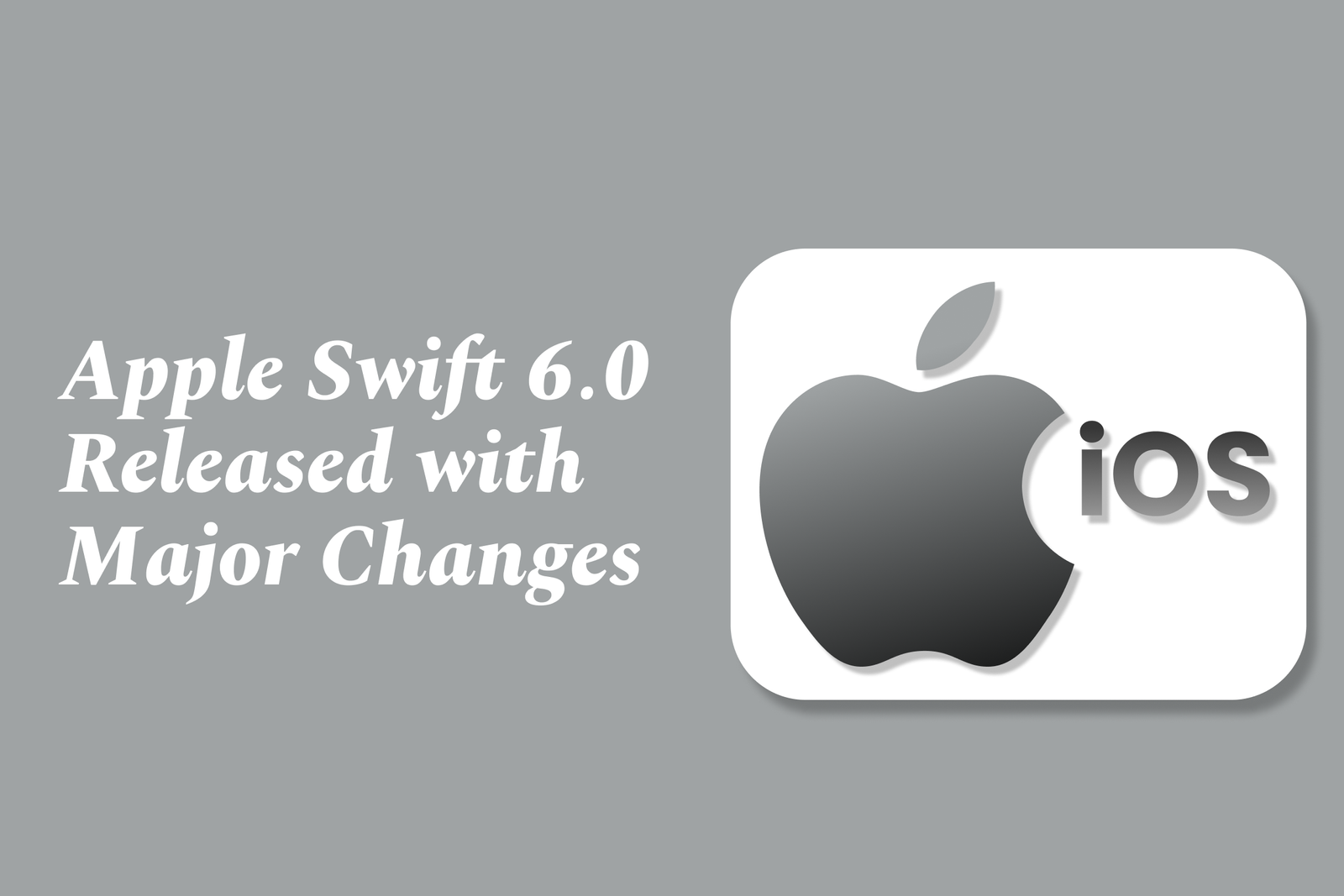Apple Swift 6.0 Released With Major Changes
Apple has released Swift 6.0, featuring major updates like enhanced concurrency with stricter safety checks, typed throws for precise error handling, support for non-copyable types in generics, expanded cross-platform APIs, and improved debugging to boost performance and safety.
Apple Swift 6.0 Released with Major Changes
1 ) Overview of Swift 6 Release
Swift 6 has been officially released as a major update, expanding the language’s reach beyond just app development into broader domains such as libraries, internet scale services, and performance critical secure code.
This release introduces new low level programming features, expanded platform support (including Linux and Windows), and enhanced debugging and testing APIs.
2 ) Enhanced Concurrency Model
Swift 6 enables an opt in language mode that extends safety guarantees to prevent data races by diagnosing them as compiler errors, improving upon the previous warning system in Swift 5.10.
The new concurrency model includes improved Sendable inference and compiler analysis, resulting in fewer false positives in race detection.
Swift 6 introduces a new Synchronization library providing low level concurrency APIs like atomic operations and a mutex API for more granular synchronization control.
3 ) Typed Throws Feature
Functions in Swift 6 can now specify the exact error type they throw in their signature, adding precision and usefulness, especially in generic and resource constrained environments such as embedded Swift.
This replaces generic throwing functions with the ability to propagate precise error types and integrates better with Swift’s generics system.
The feature generalizes throwing and non throwing functions, enhancing flexibility with error handling.
4 ) Ownership and Non Copyable Types
Building on Swift 5.9’s introduction of non copyable types (denoted by ~Copyable), Swift 6 now supports these types fully within the generics system.
This enhancement enables writing generic code that can handle both copyable and non copyable resources efficiently, advancing Swift's performance and safety in resource management.
5 ) Expanded Platform Support and APIs
Swift 6 continues to scale across platforms with better Linux and Windows support.
It introduces cross platform APIs and a new Swift Testing library to unify and improve testing workflows across environments.
6 ) Swift 6 Release Process and Management
Starting March 15, 2024, the Swift 6 release branch was cut for final feature inclusion and stabilization.
All major language and API changes undergo the Swift Evolution process, with strict release criteria especially as release finalization approaches.
Several release managers oversee different Swift components and platform support to ensure a cohesive and stable release.
7 ) Impact for Developers
Complete concurrency checking is enabled by default in Swift 6, requiring many codebases to adapt significantly.
This blocking safety feature, while demanding changes, aims to improve robust concurrency handling and reduce hard to find issues.
Developers can expect substantial improvements in concurrency usability, error precision, and resource management combined with wider platform compatibility.
Summary
Swift 6 represents a major evolution for the language, prioritizing stronger safety, concurrency enhancements, and broader applicability beyond Apple platforms. It sets the stage for Swift to be used in more diverse system level, embedded, and cross platform applications, while demanding developers adapt to modern concurrency and error handling paradigms.
https://justacademy.in/news-detail/flutter-open-source-tools-roundup
https://justacademy.in/news-detail/android-system-update-statistics
https://justacademy.in/news-detail/android-file-management-app-innovations
https://justacademy.in/news-detail/flutter-europe-2025-announcements
https://justacademy.in/news-detail/android-instant-apps-developments
Related Posts
Java supports GDPR and data privacy by enabling secure data handling through encryption, controlled access, and precise data management. It allows developers to minimize PII exposure, ensure data confidentiality, and design workflows that comply with data protection regulations effectively.
Java code quality tools have evolved to include advanced static analysis, integrated security checks, and AI-powered code reviews. These updates help developers detect bugs, enforce coding standards, and enhance security, streamlining the development process and improving overall code reliability.
Java remains a cornerstone in big tech companies, evolving with modern features like records, pattern matching, and virtual threads. Its robust ecosystem, enhanced performance, and growing AI integrations keep it vital for both legacy systems and innovative new projects.
Java and CI/CD pipeline optimizations streamline Java application development by automating builds, tests, and deployments. They improve efficiency through parallelization, caching, and secure secrets management, enabling faster feedback loops and more reliable, scalable software delivery.
Java supports modern cryptography standards through its flexible Java Cryptography Architecture (JCA), enabling integration of advanced algorithms like AES, EdDSA, and post-quantum tools. Libraries like Bouncy Castle offer FIPS-certified, hardware-accelerated implementations for secure development.
Java 23 enhances record patterns by enabling concise, direct destructuring of record components within pattern matching, simplifying type checks and data extraction. This improvement boosts code readability and expressiveness by reducing boilerplate in handling immutable data classes.
Java remains a top choice for mobile app backends, powering scalable, secure, and high-performance server-side solutions. Latest trends include cloud-native microservices, reactive programming, and enhanced JVM optimizations, enabling efficient, flexible, and robust mobile backend development.
Java SE 24 and LTS Java SE 21 offer enhanced features and performance, while Apache Spark 4.0.0 introduces Scala 2.13 support and advanced ML and SQL capabilities. Together, they empower developers to build scalable, high-performance data applications with modern tools.
JUnit 5 modernizes Java testing with a modular architecture, improved assertions, and seamless Java 8+ support. Beyond JUnit, tools like Mockito and AssertJ enhance mocking and assertions, creating a powerful, flexible ecosystem for writing clean, efficient Java unit tests.
Java plays a pivotal role in cloud automation tools by providing a robust, platform-independent language used to build scalable automation frameworks like Jenkins and Selenium, enabling efficient CI/CD pipelines, testing, and orchestration across diverse cloud environments.










